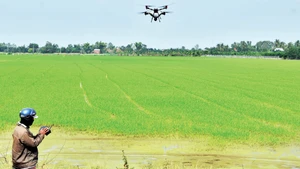In Dong Thap, many enterprises, cooperatives and household businesses have proactively adopted digital platforms in their operations, enabling their products to reach wider markets, enhance competitiveness and affirm their position in a modern business environment.
Through multiple coordinated solutions, the locality has gradually formed an e-commerce ecosystem, laying the groundwork for sustainable digital-economic development.
Proactive digital transformation
In recent years, e-commerce has boomed globally and in Viet Nam in particular, delivering practical benefits and becoming an inevitable trend. Thanks to e-commerce, businesses can easily expand markets, optimise costs, improve distribution efficiency and strengthen customer connectivity.
Recognising this trend, Dong Thap Province has incorporated the goal of developing e-commerce into its socio-economic development agenda, considering it an important task to renovate business methods and accelerate the province-wide digital-transformation journey.
The Department of Industry and Trade of Dong Thap has coordinated with relevant agencies to implement various activities in support of enterprises, cooperatives and household businesses in applying technology to production and trade; creating favourable conditions for small and medium-sized enterprises to join reputable e-commerce platforms, promote products and expand markets both within and beyond the province. These activities have helped spread the value of local products and vigorously respond to the “Vietnamese prioritise Vietnamese goods” campaign amid digital transformation.
Thien Nghi cherry-preserve production facility in Go Cong Ward, Dong Thap Province, owned by Bui Van Quang, has applied e-commerce for several years. From a small-scale facility, the business has gradually improved production processes, invested in equipment, focused on packaging and product design, built its brand story and developed online sales channels alongside traditional sales.
Bui Van Quang said: “Previously, we mainly sold within the locality, mostly to familiar customers. But since bringing our products onto digital platforms and social media, customer numbers have surged. Many people in other provinces and cities across the country have learnt about the products and placed orders. Every month, we supply about 100–200 products via online channels, several times higher than before.”
Digital transformation has spread not only among local speciality brands but also to many collective business models. Thien Phuc Cooperative in My Tinh An Commune, Dong Thap Province, currently has 175 members and offers five 3-star OCOP products: dried dragon fruit, dried bananas, dried pomelo peel, soursop tea and yellow-skin dragon fruit. The cooperative has developed an e-commerce site to introduce products, receive customer feedback, update market information and support more efficient product consumption.
Nguyen Huu Phuc, Director of the cooperative, said that selling via e-commerce allows them to reach customers directly without intermediaries, thereby achieving higher selling prices and better business performance if managed well. To develop such a system, facilities must focus on product quality, design, output and ensuring delivery speed.
Despite these achievements, the rollout of e-commerce in Dong Thap still faces many difficulties. Some large orders exceed the cooperatives’ supply capacity. Shipping costs for individual orders remain high. Technological capability and promotional activities have yet to be effective. Additionally, cooperatives struggle with funding to maintain online sales systems and lack technically skilled personnel, making it difficult to ensure stable, long-term operations.
An inevitable direction
Understanding the crucial role of e-commerce, the Department of Industry and Trade of Dong Thap has, in recent years, proactively advised the Provincial People’s Committee to issue and implement annual plans for e-commerce development. At the same time, departments, sectors and localities have integrated digital-transformation content into their working programmes to encourage broader application in business practice.
The Department of Industry and Trade of Dong Thap has organised training courses on online-sales skills, introduced digital platforms, guided the creation of online storefronts on e-commerce platforms, and provided training in livestreaming and modern product-promotion techniques. The locality has developed 305 community digital-technology teams to guide residents in using online public services, digital payments, management tools and accessing the digital business environment more easily.

Notably, the “My Xuong e-commerce commune” model (now part of My Tho Commune, Dong Thap Province) applies digital technology to building agricultural-production data and promoting local agricultural product consumption via e-commerce. The “Market 4.0” model at 18 markets in Dong Thap Province has also contributed to advancing digital transformation in business and payment activities.
Overall, the digital-transformation solutions implemented in Dong Thap have initially created noticeable changes in public and business awareness, improved technological application capacity, and helped many local products and services reach wider markets.
Deputy Director of the Department of Industry and Trade of Dong Thap, Dang Van Tuan, said that e-commerce is an inevitable trend in digital-economic development. However, to maximise its effectiveness, businesses must continue deep, long-term investment and change operational mindsets, focusing on brand building, standardising operating procedures and enhancing the digital capacity of their workforce.
In the coming period, the Department of Industry and Trade of Dong Thap will continue improving infrastructure for e-commerce towards modernity, synchronisation and sustainability. The locality will facilitate enterprises in proactively adopting and mastering new technologies in online-platform operations, logistics and digital payments, contributing to the improvement of production-business models; and encourage a shift from cash payments to cashless methods. Dong Thap Province will apply artificial intelligence, data technologies and modern tools to personalise customer experiences, and organise training programmes to strengthen digital-skills capacity among managers and businesses.
















